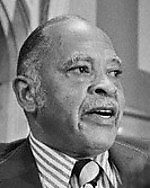S. Howard Woodson facts for kids
Quick facts for kids
S. Howard Woodson
|
|
|---|---|
 |
|
| Speaker of the New Jersey General Assembly | |
| In office 1974–1976 |
|
| Preceded by | Thomas Kean |
| Succeeded by | Joseph A. LeFante |
| Member of the New Jersey General Assembly |
|
| In office 1964–1976 |
|
| Preceded by | Vince Parano |
| Succeeded by | Helen Chiarello Szabo |
| Constituency | Mercer (1963–68) District 6B (1968–72) 13th district (1972–76) |
| Member of the Trenton City Council | |
| In office 1962–1963 |
|
| Personal details | |
| Born |
Samuel Howard Woodson, Jr.
May 8, 1916 Philadelphia, Pennsylvania |
| Died | July 28, 1999 (aged 83) Trenton, New Jersey |
| Resting place | Ewing Cemetery Ewing, New Jersey |
| Political party | Democratic Party |
| Residences | Trenton, New Jersey |
| Alma mater | Cheyney Training School for Teachers Morehouse College Atlanta University |
Samuel Howard Woodson, Jr. (born May 8, 1916 – died July 28, 1999) was an important leader from New Jersey. He was a pastor, a fighter for civil rights, and a politician from the Democratic Party. He made history by becoming the first African American to be chosen as the Speaker of the New Jersey General Assembly.
Contents
Early Life and Education
Samuel Woodson was born in Philadelphia, Pennsylvania. He went to public schools there. Later, he earned a degree in education from Cheyney Training School for Teachers. This school is now known as Cheyney University of Pennsylvania.
In 1940, he became the first graduate student at the School of Divinity at Morehouse College in Atlanta. While studying, he also helped the pastor at Wheat Street Baptist Church. He earned a special degree called a Bachelor of Divinity from Morehouse. This was the first graduate degree ever given by the school. He continued his studies in sociology at Atlanta University.
Working for Civil Rights
Woodson became a minister in 1941. In 1944, he became the pastor of Grace Temple Baptist Church in Lawnside, New Jersey. Two years later, in 1946, he moved to Trenton, New Jersey. There, he became the pastor of Shiloh Baptist Church, where he served for 53 years.
In Trenton, Woodson was very active in the civil rights movement. He was the president of the local branch of the NAACP. In 1960, he became the president of the NAACP for the entire state. He worked with Governor Richard J. Hughes to help more minority families own homes. This led to new laws that stopped unfair housing practices.
Political Career
In 1962, Woodson was elected to the Trenton City Council. He was the first African American to be elected to office in Mercer County, New Jersey. In 1964, he won a special election to join the New Jersey General Assembly. He served in the Assembly for 13 years in a row. He also held leadership roles, like minority leader and associate leader.
Becoming Speaker of the Assembly
The Speaker is a very important leader in the General Assembly. They lead meetings and help make decisions. In 1972, many Democrats wanted Woodson to become the Speaker. But another Assemblyman, David Friedland, made a deal with Republicans. This led to Thomas Kean becoming Speaker instead. This meant Woodson did not become the first African American Speaker at that time.
However, when Democrats gained control of the Assembly in 1974, Woodson was chosen as Speaker. This made him the first African American to hold a state house speakership since the Reconstruction era. Reconstruction was a time after the American Civil War when the country was rebuilt.
Later Work and Life
In 1976, Woodson left the Assembly. Governor Brendan Byrne appointed him to lead the New Jersey Civil Service Commission. He held this job until 1982.
In 1990, Governor James Florio appointed Woodson again. This time, he became the Director of the Division of Equal Employment Opportunity/Affirmative Action. He retired from this position in 1994.
Samuel Howard Woodson, Jr. passed away on July 28, 1999, in a Trenton hospital. He was 83 years old.
Images for kids


